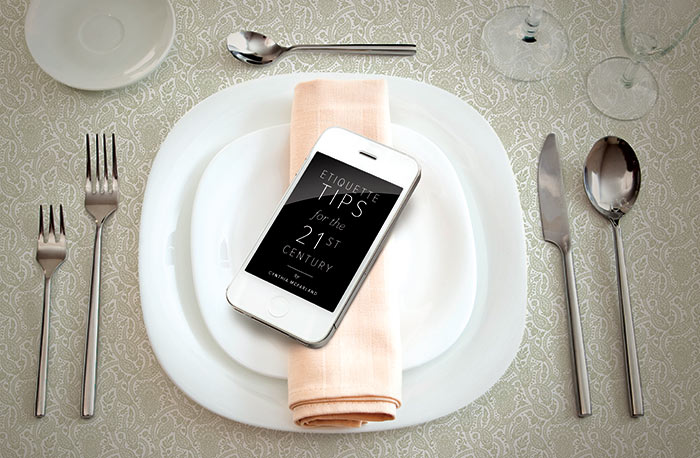
When I was 9 years old, my mother decided it was time to haul out the etiquette book in an effort to teach my brother and me what we didn’t know about manners and proper behavior. I found it fascinating. My brother, not so much. But what can one expect from a 6-year-old boy who’d rather be out playing in the dirt than learning how to write thank you notes and where to place the dessert fork?
We spent many summer lunch hours at our Formica-topped kitchen table as Mom perused the book and coached us on how to handle various situations we hadn’t yet encountered in our tender elementary school years. Some of those early lessons stuck. My brother is one of the only men I know who actually sends handwritten thank you notes, and I don’t own a single dessert fork, but I know where they should go in a formal table setting.
Etiquette For Today
When it comes to etiquette, some things remain timeless (a gracious “thank you” never goes out of style), while other advice is now considered out of date (only the guy can initiate a date and pays for everything). The writers of etiquette books in the 1950s could never have imagined a world where people would use personal phones in a movie theater or stop a face-to-face conversation to respond to a text.
Alas, such egregious actions are commonplace today. We rounded up etiquette tips from the experts to cover a host of situations. Read on to brush up on modern manners. And I promise, no mention of dessert forks!
Cell Phones: Blessing Or Curse?
You’d like to think cell phone etiquette should be a no-brainer. Unfortunately, that’s hardly the case. Sticking to these basic guidelines is good manners any way you look at it.
Create and respect phone-free zones (the dinner table, the bedroom, etc.).
Spare us the obnoxious super loud ring tone. Those questionable lyrics may make your buddies laugh, but it’s certain to make your boss look at you in a whole new light.
When talking on your phone in public, maintain a minimum distance of 10 feet from others. Chatting when you’re urinating in a public restroom or waiting in a crowded line is a no-go.
Lower your voice to a discreet level.
Avoid overly personal topics (or arguments) when others may overhear.
If you’re having a face-to-face conversation with someone, don’t text or take a call.
Put your phone on silent before entering a movie theater, church, restaurant or other public place.
Don’t text and drive. As proven over and over, this simple action can be deadly.
Places where taking a call on your cell phone is off-limits:
If the call is so crucial it can’t wait, exit as quietly and quickly as possible and take the call once you are outside and away from others. But do consider how it looks to walk out of your daughter’s ballet recital to answer your phone.
Funerals/funeral home visitations
Church
Live performance events
Movie theater
Library
Dinner party (your own or when you’re a guest)
Public restroom stall
Fast food restaurant line
Doctor/dentist office
Checkout line at any store (This is the ultimate rudeness: not even acknowledging the store employee who’s waiting on you because you’re blabbing away on your phone.)
Email Dos & Don’ts
Electronic communication has changed the way we communicate but not always for the better. Here’s how you can improve your emails, both business and personal:
Do:
Fill in the subject line.
Keep it short and concise.
When sending to multiple people, either send individually or use blind-copy instead of putting all addresses in the To and CC spaces.
Program an “out of office” response if you’re on vacation from work, letting senders know how long you’ll be away and who to contact if their message is urgent.
Don’t:
Use all caps; it’s the equivalent of shouting.
Forward off-color or questionable jokes or stories.
Flag a message as urgent unless it truly is.
Gossip or complain about colleagues or, even worse, your boss.
Argue or break up via email. Even in this digital age, there are some things that still require face-to-face communication.
Discuss private or sensitive topics in a business email.
Workplace Manners
Unless you’re hoping to get fired, you’ll want to follow basic office etiquette. Although these may seem obvious, apparently they’re not, as numerous surveys have found the following to be concerns in offices across the country.
Be on time. (Duh, right?)
Dress appropriately. Some attire is never acceptable in the office—even on “Casual Fridays.”
Respect office policy for cell phone use, and don’t check your phone while in a meeting.
Think before you speak, and address any issues with a co-worker in private.
Always tell the truth, even if you must do so delicately.
Keep personal information private. Anticipate that anything you share with another employee can make its way back to your boss.
Watch your language even when on break or at lunch.
Keep your cool, and don’t sink to anyone else’s level to make a point.
Avoid silly pranks and jokes at someone else’s expense.
Watch those comments. What you meant as a flirtatious compliment may actually fall into the category of sexual harassment.
If you bring lunch to work, skip the overly smelly meals. Your reheated shrimp scampi can stink up the whole office.
Clean up after yourself when using shared spaces.
Never help yourself to items from co-workers’ desks or any company property. That includes sending a personal package by using the company’s Fed Ex or UPS account.
Never drink too much at a company event.
Party Politely
Being invited to celebrate an event or to share a meal is supposed to be enjoyable. Here’s how to negotiate the social environment whether it involves extended family, your employer, old school chums or your spouse’s co-workers.
Acknowledge the invitation promptly, even if no RSVP is requested. If you don’t, it appears you may be waiting for a better offer.
Don’t bring an unexpected guest with you.
Be punctual but never early. Arriving within 15 minutes or less of the stated time is typically considered “on time.”
If you’re running especially late, call the host and let them know.
Always bring a gift if the party or event is honoring a specific person (birthday, graduation, shower, bar/bat mitzvah, etc.)
Be a team player. Go along with the host’s timeline even if it means postponing that laugh-out-loud story you were just about to tell.
Offer to lend a hand. Your host may or may not take you up on it, but it’s always polite to offer to help in some way.
Don’t go to extremes—when eating, talking and especially when indulging in alcoholic beverages. You don’t want to be the one they all talk about later.
Thank your host or hostess when leaving and follow up with a phone call the day after. A written thank you note is the way to go for formal events or any party in which you were the guest of honor.
Wedding Faux Pas
Some people take having a good time too far. According to one California-based event planning company, a common problem is guests engaging in sexual relations at the wedding/reception. While we’re all for having fun, does anyone really need to be informed that such activities are way out of line at someone else’s nuptials? Now that we have that covered, what else should a good guest watch out for?
Don’t bring a guest unless your invitation allows.
Respect the “no children at ceremony” request.
Put away your cell phone and electronic devices. Watching a sporting event or calling a friend because you’re bored is simply bad manners, and trying to take photos on your phone during the ceremony might ruin the professional photos the couple has already planned for if you get in the way of a good shot.
Don’t drink to the point of inebriation.
If asked to give a toast, keep it short (two to three minutes max), sincere and don’t venture into dangerous personal territory.
Hold it until you find a restroom. Public urination at events has become surprisingly common, but please, use an actual restroom, even if you must wait in line.

Facebook Courtesies
Ahh, social media… the delight of sharing photos and information that can make your day… or ruin someone else’s. Not much is left private any more, but you can and should avoid stepping on the toes of others. It will spare feelings and might even save your job.
Consider those updates before posting. Do your friends really want to hear what you had for lunch? Do they care that you went to the gym… again?
Feel free to ignore friend requests from strangers or people you know but don’t want to “friend.”
Don’t “friend request” your employer.
Don’t tag co-workers’ personal photos without their permission, even if you’re friends outside the office.
Never post a photo of someone else’s children without permission.
Untag yourself from a photo if you feel uncomfortable. Just remember that you can’t be “retagged” once a tag is removed.
Respect Facebook Chat. Friends may not be able to respond when working, for example, even if their Facebook window is open.
Sources: Emily Post’s Etiquette, 17th Edition, Peggy Post, cellphones.org, pcworld.com, realsimple.com






